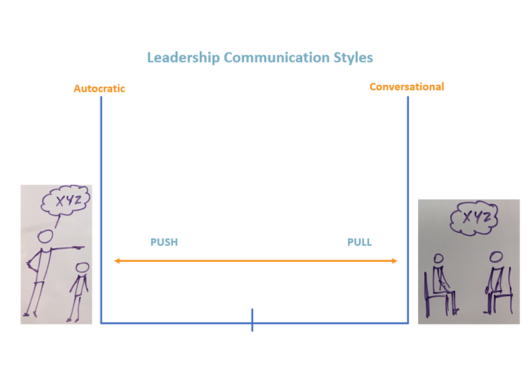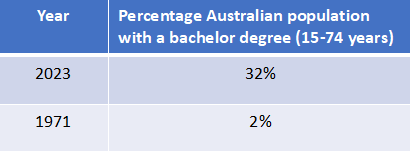
Leadership communication styles: Are you Autocratic or Conversational?
During times of change, leaders can’t communicate enough. But how you communicate makes a tremendous difference towards inspiring your team towards greater engagement and increased productivity. Some leaders are autocrats – ‘my way or the highway’ – while others take a more collaborative approach. How does your leadership style affect your team’s performance?
Autocratic communication style
An autocratic leadership style takes no prisoners! Autocratic communication is push-orientated, sometimes referred to as a ‘parent-to-child’ approach, with the leader’s decisions and directives considered absolute. Autocratic styles are most beneficial when quick, decisive action is required – for example, during a crisis or time of transformative change – or when a mandated approach is needed to unify many employees or organisational branches. Under autocratic leadership, employees can feel they lack agency in their roles and teams.
Conversational communication style
On the other end of the continuum are leaders who take a more democratic approach, leading through collaboration and conversation – ie. pull-orientated. In the corporate world, this approach has been on the rise since the mid-1990s, with widespread adoption of the Internet and, by the late 2000s, smart phones. Sometimes referred to as an ‘adult-to-adult’ approach, a conversational style takes into account the advice and ideas of employees. With collaboration and knowledge-sharing encouraged, this style is beneficial for innovation and continuous improvement – though, of course, too many cooks can dilute an organisational strategy.

A changing workforce
According to the Australian Bureau of Statistics in 2023, 32% of adults (aged 15-74 years) held a bachelor degree or above. Compared to 1970, when 2% of Australian adults had a postgraduate qualification, this is a factor of 16 indicating an exponential growth in knowledge workers over two generations. And this growth in knowledge has impacted how leaders communicate.
 Sources:
Sources:
- https://www.abs.gov.au/statistics/people/education/education-and-work-australia/latest-release#qualifications
- https://www.ncsehe.edu.au/who-goes-to-university-the-changing-profile-of-our-students/
Leaders don’t have all the answers
We’ve described the extremes of autocratic and conversational leadership – but, of course, our approach can be ineffective at either end of this communication spectrum. An effective leader today must be across strategy, implementation and review; as such, they sample from both styles, consulting with their knowledgeable teams in order to make confident organisational decisions. This balanced leader communicates their vision (to achieve objective) and values (for staff behaviour and culture), but also involves their staff in decisions – because educated people typically embrace change they’re engaged with.
Extra credit
Be mindful of your autocratic and conversational communication styles – what balance is best for your team? Reflect on your style – and your organisation’s leadership culture – by considering the following questions:
- Does your style differ from your boss’s style? Where are they on this continuum?
- Have you noticed any shifts in your organisation’s communication style over the past few years? If so, shifts in which direction?
Disempowered employees can feel that change is inflicted upon them by their leaders – but engaged teams drive a plan forward together. Our one-day Team Planning Workshop for Operational Teams harnesses the power of existing teams, empowering them with shared priorities and strategies.
If you are curious about the how this workshop might guide your team and its project, please get in touch.
Damien Edmonds, m: 0447 147 788, e: damien@edmondsfacilitation.com.au
Edmonds Facilitation exists to empower leaders and their teams to work better together. Our professional workshop and facilitation services support teams to realise their potential through improved collaboration, creative problem-solving and commitment to shared goals.
EF Director Damien Edmonds has a clear passion for communication. He brings 25 years of expertise – along with his extensive toolkit of tried-and-true facilitation techniques – to team workshops and discussions. If your organisation is managing change, uncertainty, growth – or just needs a creative shakeup – get in touch with Damien for a chat.

